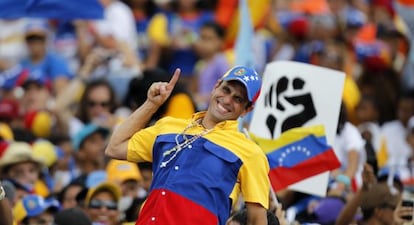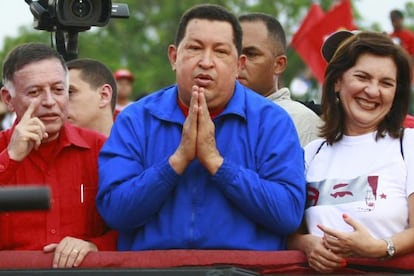Venezuelans to decide on Sunday whether to keep faith in Chávez
Opponent Capriles gains momentum with massive turnout at Caracas rally

Under a tense atmosphere and tight security, Venezuelans will go to the polls on Sunday in a heated election in which they will decide whether to give President Hugo Chávez and his self-styled "21st-century socialism" a fourth term or switch to a more progressive, market-friendly government, as promised by his rival, Henrique Capriles Radonski.
Support for Capriles, a youthful-looking former governor, has been snowballing in recent weeks, as was demonstrated by a massive rally of hundreds of thousands of supporters who gathered Sunday in the capital, Caracas. It was described as the biggest turnout the opposition has drawn in recent years. "After October 7, there will be no more hate," 39-year-old Capriles boomed from the top of a small platform, looking minuscule against the backdrop of a sea of supporters bathed in the red, blue and yellow colors of the Venezuelan flag.
Chávez, 58, who battled cancer last year, is running for another six-year term, an unprecedented feat in Venezuela since democracy was restored in 1958.
The last polls released before Sunday's official cutoff date for surveys to be published, differ in their results. Pro-government pollsters give Chávez a roughly 10-percent lead, but that margin has dropped from recent months when the same polls had given him leads of between 25 and 30 percent.
Never, never have I seen such a tidal wave of people," said one man
Those favorable to the opposition say Capriles will win the election by a narrow margin. But political analysts say there are between one million and 1.5 million voters who are still undecided.
"The information we get from the polls is, at best, confusing," said Federico Welsch, a political analyst and retired professor at Caracas' Simón Bolívar University, in an interview with CNN.
Chávez, who also commands large masses of supporters at his own rallies, has refused Capriles' offer to debate. "Kid, do you think you have anything important to say?" he told his supporters last Saturday. "You don't even know how to talk."
Nevertheless, as the campaign winds down this week, Chávez has focused more on pledges to push his socialist agenda further. "This is going to be a knock-out, and don't you think otherwise," he told reporters before attending a rally in Yaritagua, Yaracuy state on Monday. When asked again about the possibility of a debate, the president again responded: "That's a bad joke - you know that eagles don't hunt flies."

Alluding to his illness - Chávez underwent operations in Cuba for two cancerous tumors in an undisclosed area of the pelvis last year, followed by radiation treatments - the president told supporters that he hoped God would give him health "to continue to deal with the problems that Venezuelans are facing."
"Nearly seven million Venezuelans live in poverty; that is where the battle is. We are going to release all of those Venezuelans from the historic poverty that was imposed by the bourgeois governments."
Nevertheless, according to polls, more than 70 percent of Venezuelans believe that crime and a lack of safety are the biggest problems in the country today. Figures released by the Venezuelan Observatory for Violence state there were 19,336 murders in 2011, or one committed every hour. The last time Chávez's government released homicide statistics was in 2009, when the Interior Ministry revealed the country's murder rate was 43 for every 100,000 people.
Capriles, who is popularly known as el flaco (literally, the thin one, but in Venezuela it is used as an affectionate term meaning handsome or good-looking), has been on a stump to push for more development in other cities. Speaking on Monday in the western Andean town of Mérida, the opposition contender pledged to help farmers and end the power blackouts that frequently occur in that region.
Chávez, who also commands masses at his own rallies, has refused to debate
"I come here today to give up my commitment to solve the problems so that you can live peacefully," Capriles said.
But it was Sunday's surprise massive turnout at his rally in the capital that kept the social media networks abuzz with aerial pictures of the streets of Caracas overflowing with people and the candidate in rock-star-like poses.
José, a middle-aged man, said he couldn't believe what he was seeing. "Never, never have I seen such a tidal wave of people. It is serious business this time around," he said, referring to the then-fractured opposition's unsuccessful attempts to defeat Chávez in his last two re-elections since he was first swept into power in 1998.
Marisol, a 33-year-old businesswoman who lives in a neighborhood that is filled with Chávez supporters, said she was supporting Capriles because of the "soaring crime" the capital is now facing. Another rally-goer, Kinlin, a computer engineer, said he hasn't voted since Chávez first came to power 14 years ago, but that he was going back to the polling station on Sunday because "of the economic disaster and the need for change."
Capriles, whose family is connected to a media conglomerate and a chain of movie houses, has pledged to transform Venezuela's economy from a petroleum-based one to a diverse open market by encouraging outside investments for tourism, mining and technology.
Both candidates will close their campaigns on Thursday - Chávez in Caracas and Capriles in Barquisimeto, Lara state.
The military, which traditionally is out in full force to guarantee order on election day under the so-called Plan República, has warned that it won't tolerate any disruptions at the polls by either side.
Tu suscripción se está usando en otro dispositivo
¿Quieres añadir otro usuario a tu suscripción?
Si continúas leyendo en este dispositivo, no se podrá leer en el otro.
FlechaTu suscripción se está usando en otro dispositivo y solo puedes acceder a EL PAÍS desde un dispositivo a la vez.
Si quieres compartir tu cuenta, cambia tu suscripción a la modalidad Premium, así podrás añadir otro usuario. Cada uno accederá con su propia cuenta de email, lo que os permitirá personalizar vuestra experiencia en EL PAÍS.
¿Tienes una suscripción de empresa? Accede aquí para contratar más cuentas.
En el caso de no saber quién está usando tu cuenta, te recomendamos cambiar tu contraseña aquí.
Si decides continuar compartiendo tu cuenta, este mensaje se mostrará en tu dispositivo y en el de la otra persona que está usando tu cuenta de forma indefinida, afectando a tu experiencia de lectura. Puedes consultar aquí los términos y condiciones de la suscripción digital.








































